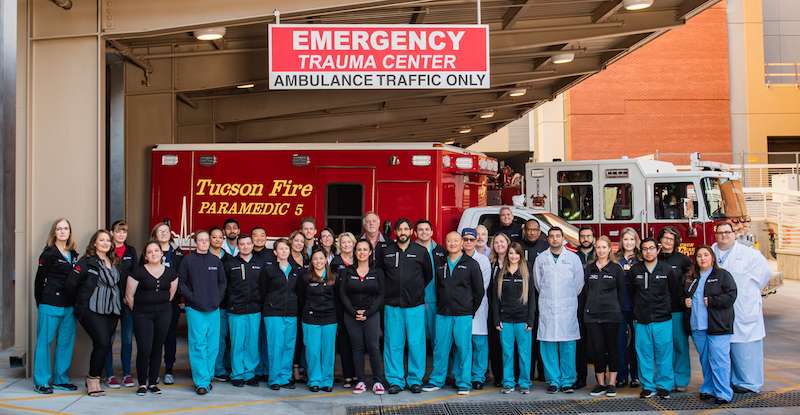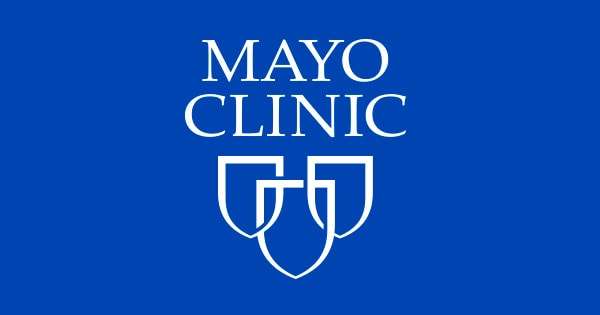As the only Level 1 Trauma Center south of Phoenix, Banner – University Medical Center Tucson’s Emergency department handles patients with the most serious injuries.
We recognize that emergencies are often stressful situations. That’s why we take pride in ensuring your visit to the Emergency room at Banner – University Medical Center Tucson goes as smoothly as possible. Our Emergency department is designed so you can receive care as quickly as possible.
The triage process helps determine the severity of the patient’s condition to assure that the most urgent patients are seen by a health care provider first. As in most hospital emergency rooms across the country, patients receive treatment based on the severity of their emergency, not the order of arrival.
Communication plays a key role in your successful treatment in the Emergency department. Language and interpretive services are available at all Banner facilities; please ask your nurse or Emergency department receptionist about them.
Academic Medicine Difference
The partnership between Banner Health and the University of Arizona brings clinical care delivery, education and research to the forefront of the patient experience.
Carondelet St. Joseph’s Hospital has received a level one trauma center designation from the Arizona Department of Health Services, which means staff can provide critical care for patients with life-threatening injuries.
The new status will be effective starting Sunday for the hospital at 350 N. Wilmot Rd.
“We’re really excited to provide this care for Southern Arizona,” said the hospital’s chief operating officer, Dr. Nikki Castel. “There’s a huge need.”
Banner-University Medical Center has been Southern Arizona’s only level one trauma center since 2003, typically handling about 5,000 trauma cases per year with a staff of 10 trauma surgeons as well as medical residents and clinical trauma fellows. The medical center, at 1625 N. Campbell Ave., can also take level two pediatric trauma patients and also provides a burn program for children and adults.
Both Castel and Dr. Francis Ali-Osman, a trauma surgeon and St. Joseph’s Medical Director for trauma services, said the COVID-19 pandemic made the process that much more challenging this year, and they are proud of how hard staff worked toward this goal while also treating the novel virus.
“They didn’t let COVID stop them from charging forward and taking care of high acuity patients,” Castel said.
The hospital began working toward this designation in November 2019 with the opening of new trauma bays — which are specially equipped rooms — as well as a trauma intensive care unit. St. Joseph’s passed into level three in January with no deficiencies, Ali-Osman said.
The next step is national certification with the American College of Surgeons.
Specialities that will now be offered for critical injured patients include orthopedic trauma surgery, neurosurgery, vascular and cardiovascular surgery, general surgery, facial surgery, hand surgery, ophthalmology and plastic surgery.
“If you are critically injured, the closer you are to a level one trauma center the better your chances for survival,” said Ali-Osman.
The hospital now has four trauma surgeons on staff and can also tap into a larger group of providers here as needed. However, they cannot provide trauma services for children and teens under 18, but they can stabilize pediatric patients before moving them to a pediatric trauma center.
“Southern Arizona continues to grow, and this capability is needed our community,” Ali-Osman said. “The way this hospital has come together to put this all together is outstanding and really quite amazing.”
Photos: St. Joseph’s Hospital before opening day, 1961
St. Joseph’s Hospital in 1961
St. Joseph’s Hospital in 1961
St. Joseph’s Hospital in 1961
St. Joseph’s Hospital in 1961
St. Joseph’s Hospital in 1961
St. Joseph’s Hospital in 1961
St. Joseph’s Hospital in 1961
St. Joseph’s Hospital in 1961
St. Joseph’s Hospital in 1961
St. Joseph’s Hospital in 1961
Contact reporter Patty Machelor at 806-7754 or [email protected]
Subscribe to stay connected to Tucson. A subscription helps you access more of the local stories that keep you connected to the community.
Get local news delivered to your inbox!
Subscribe to our Daily Headlines newsletter.
* I understand and agree that registration on or use of this site constitutes agreement to its user agreement and privacy policy. ![]()
Patty Machelor
Reporter
Patty covers health and social issues for the Arizona Daily Star. She previously reported on criminal justice and the courts, with an emphasis on juvenile court.

A trauma center is a highly organized hospital program for the immediate treatment of serious injuries, including bone fractures, internal bleeding, and brain injuries. Trauma is most frequently caused by car crashes, falls, and violence.
The Level-1 Trauma Program at the University of Arizona’s Division of Trauma, Critical Care, Burn and Emergency Surgery recognizes that time is a seriously injured person’s greatest opponent. Our team remains poised for immediate response 24 hours a day, every day of the year. The team is led by a trauma surgeon who is available immediately 24 hours a day with access to subspecialist surgeons as well as emergency medicine physicians, trauma nurses, and therapists. This expert team is activated about eight times a day, always prepared to provide vital life-saving medical services to our community.
Our Level 1 Trauma center at the Banner University Medical Center – Tucson is among the nation’s leaders in shorter hospital stays, lower treatment costs, and lower mortality rates, due in large part to the caliber of our surgeons.
In addition to these exceptional physicians, the trauma center at Banner University Medical Center – Tucson includes:
- Special trauma resuscitation units.
- Fully-staffed operating rooms available for immediate use.
- A Surgical Intensive Care Unit staffed 24 hours a day.
- Priority status for lab work and x-rays.
- Next-generation CT scanners.
- Professional education for EMTs, paramedics, nurses and physicians.
- More than a dozen on-call specialists, including orthopedic surgeons, neurosurgeons, pediatric intensivists, and more.
Along with clinical care, the Level-1 Trauma Center is highly active in community education and outreach, including Stop the Bleed courses and the annual Southwest Regional Trauma Conference geared toward first responders and other medical professionals.
Make an Appointment: (520) 694-8888
St. Joseph’s Hospital earns Level I Trauma Center designation
Sep 17, 2020
 TUCSON – Carondelet St. Joseph’s Hospital has received Level I Trauma Center designation, signifying the hospital offers care for complex, critical life-threatening injuries.
TUCSON – Carondelet St. Joseph’s Hospital has received Level I Trauma Center designation, signifying the hospital offers care for complex, critical life-threatening injuries.
Granted by the Arizona Department of Health Services, the designation is effective at 12:01 a.m. Sunday morning, Sept. 20, 2020. Carondelet St. Joseph’s Hospital is located at 350 N. Wilmot Rd. in Tucson.
Level I Trauma Center designation is an important milestone for St. Joseph’s Hospital, which made significant investment in talent and technology to become trauma capable.
Numerous specialties including orthopedic trauma surgery, neurosurgery, vascular and cardiovascular surgery, general surgery, facial surgery, hand surgery, ophthalmology and plastic surgery, among others are available around the clock through a comprehensive team of medical specialists and support staff.
Adding trauma services included investment in two new trauma rooms, emergency department renovations, staff training and related equipment and instruments.
“Carondelet has a longstanding commitment to offering advanced levels of care for Southern Arizona. The Level I Trauma Center designation is an affirmation of that commitment and our ability to provide care for complex, life-threatening injuries. Southern Arizona continues to grow, and this capability is needed our community,” said Trauma Surgeon Dr. Francis Ali-Osman, medical director for trauma services.
Successfully bringing a new trauma program online in the midst of the coronavirus pandemic was an added challenge, but Carondelet St. Joseph’s staff was undeterred. Years in planning, Level I designation is a culmination of preparation, construction, recruitment and collaboration with key stakeholders including physicians, first responders, hospital staff and community leaders.
“There is no doubt this has been a most difficult time, but our Carondelet associates and physicians dug in, met the challenges head-on and delivered this program for our community,” added Tenet Arizona Group CEO Brian Elisco. “Introduction of trauma services brings a number of benefits those we serve.”
Designation as a Level I Trauma Center recognizes St. Joseph’s Hospital’s clinical capabilities and integration of services across the hospital, noted Dr. Alicia Mangram, senior director of trauma services.
“St. Joseph’s was already known for its brain and spine, orthopedic, cardiovascular and other specialties. Becoming a Level I Trauma Center demonstrates the successful integration of individual roles not only in the emergency department, but throughout the hospital in the operating rooms, diagnostic imaging, ICU and other areas for the advanced level of service we’ll provide.”
Carondelet St. Joseph’s Hospital Chief Operating Officer Nikki Castel, MD, added, “Words cannot express how much we appreciate the support of the entire St. Joseph’s medical staff and associates over the last several months. Dr. Ali-Osman and the entire trauma team have done an extraordinary job in bringing the program on line. We are exceptionally proud of this achievement, and look forward to working with our EMS providers and first responders to provide trauma services to Southern Arizona.”
Trauma Center milestone marked at St. Joseph’s Hospital
Sep 25, 2022
Advanced capabilities integrate numerous specialties for critically injured patients
TUCSON – In its first year as a state-designated Level 1 Trauma Center, staff at Carondelet St. Joseph’s Hospital have treated thousands of complex injuries, comforted patients and families, and celebrated lives saved.
Level 1 Trauma Center designation for St. Joseph’s Hospital, 350 N. Wilmot Rd., created much-needed additional resources for patients with life-threatening and critical injuries. The Arizona Department of Health Services granted the designation on Sept. 20, 2020.

“With the rapid growth taking place in Southern Arizona there was definitely a need for another Level 1 Trauma Center in Tucson,” said Lori Danko, Trauma Program Director at St. Joseph’s Hospital.
Providing Level 1 Trauma services means Carondelet St. Joseph’s Hospital has numerous specialties available around the clock including orthopedic trauma surgery, neurosurgery, vascular and cardiovascular surgery, general surgery, facial surgery, hand surgery, ophthalmology and plastic surgery, among others, through a comprehensive team of medical specialists and support staff.
St. Joseph’s Hospital invested in dedicated trauma suites with specialty equipment and instruments, and conducts ongoing staff training to support trauma services.
“Successfully launching a new trauma program in the midst of the coronavirus pandemic was an added challenge, but our staff was committed to making it happen,” said Trauma Surgeon Dr. Francis Ali-Osman, Medical Director for Trauma Services.
Dr. Ali-Osman explained that many trauma patients are from motor vehicle accidents, but trauma injury comes in many forms. “Hikers and bicyclists can suffer traumatic injury. Injury can occur at home from falls. And unfortunately, we do see the results of violence in the community. Trauma does not discriminate in who and where it occurs.”
Collaboration, education and outreach are key components of Carondelet’s Level 1 Trauma Center. St. Joseph’s Hospital provides monthly Trauma Grand Rounds, regular webinars and in-person training for its staff as well as the EMS community and other hospital organizations.
“Our Health Care Collaboration Committee launched in the Spring to help build relationships and communication with our EMS partners and transferring hospitals. “It’s a great opportunity to share training, best practices and how trauma services can help our patients,” noted Danko.
St. Joseph’s ability to treat brain and spine, orthopedic and other traumatic injury is a successful integration of specialties throughout the hospital, said Carondelet Market CEO Monica Vargas-Mahar. “Trauma care may start in the emergency department, but it extends to surgery, diagnostic imaging, ICU and other areas for the advanced level of service provided by a Level 1 Trauma Center.”
Planning for the trauma status began several years ago and is a culmination of preparation, construction, recruitment and collaboration with key stakeholders including physicians, the EMS community, hospital staff and community leaders.
“Carondelet made a significant investment in talent and technology to create the Level 1 Trauma Center at St. Joseph’s Hospital. We appreciate the dedication and efforts of those who worked so hard to assure this advanced level of care is available for residents of our community,” said Vargas-Mahar.
Learn more about trauma care at Carondelet St. Joseph’s Hospital.




